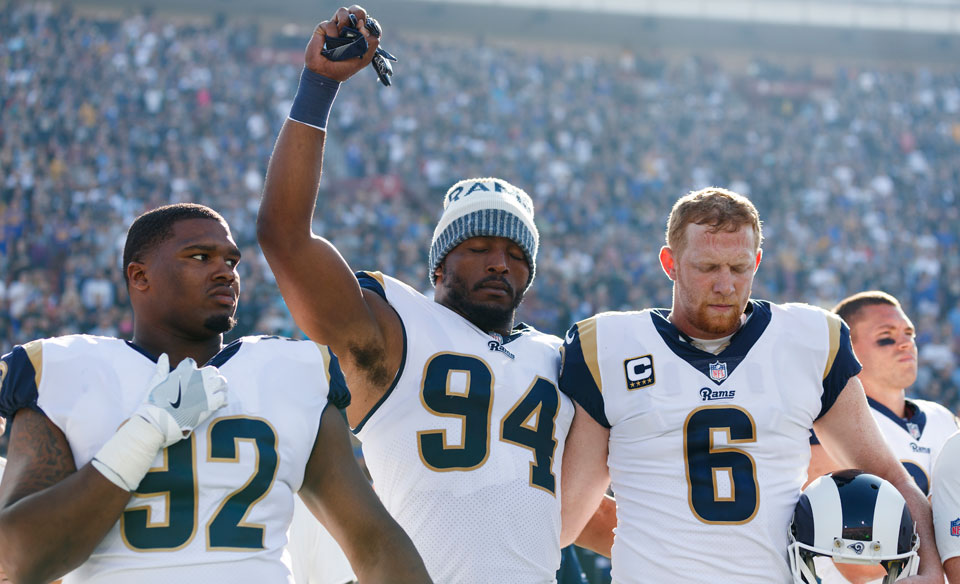
ESPN said that it will not show the playing of the national anthem before the “Monday Night Football” regular season broadcasts, even as the anthem protest debate continues.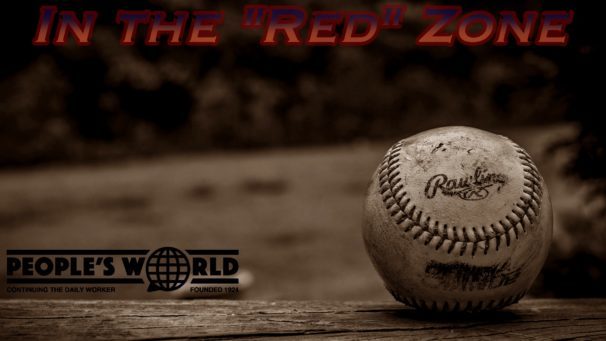
With the NFL preseason just starting, the league and players have already been criticized by Trump, sponsors, and fans for not disciplining players who knelt during the anthem.
New ESPN president Jimmy Pitaro told reporters last Friday, Aug. 17, the league—or Trump—did not pressure the network. Piatro said the NFL was informed of their decision as a courtesy.
“We generally have not broadcasted the anthem, and I don’t think that will change this year. Our plan going into this year is to not broadcast the anthem.
“Again, that could change. It’s unpredictable what could happen in the world but as of now, we’re not. We have communicated that back to the NFL. They have not asked, but as a courtesy and good partners we have let them know what our plans are.”
While many rabid, Trump supporting football fans are pushing for more displays of patriotism during games (whatever happened to the “just stick to sports” argument?), the decision by ESPN is consistent with their preexisting national anthem policy.
The same goes for other networks.
In October 2017, Fox Sports said their standard procedure was not to show the playing of the national anthem live during “regionalized coverage of NFL games.”
NBC said in January 2018 that during the Super Bowl, if players were to take a knee, they would be shown live. And ESPN has occasionally shown the national anthem before games: Week 1 of regular season on the 16th anniversary of 9/11, in week 3 of the 2017 season, after Trump’s criticism of players, and in week 4, after the mass shooting in Las Vegas.
In the two seasons since former San Francisco 49ers quarterback Colin Kaepernick first took a knee to shine a light on racism and police brutality, the national anthem has been a hotbed of controversy—stoked heavily by our tweeter-in-chief.
The policy triggered more backlash, with some players saying they would continue to take action, some owners refusing to fine or discipline protesting players, and a few others, most notably Jerry Jones of the Dallas Cowboys, saying their players had to stand.
During the public uproar, the NFLPA filed a non-injury grievance against the league for the “unilateral change in working conditions” which led the NFL to hold off on enforcing the policy and seek a mutual resolution with the players association.
Asked if ESPN was now a “political organization,” Piatro said: “It’s not our job to cover politics, purely, but we’ll cover the intersection of sports and politics. When something happens, when the Eagles are disinvited from the White House, or when someone takes a knee, if we think it’s newsworthy, were going to cover it.”
ESPN pays around $2 billion a year for “Monday Night Football” broadcasting rights.
Piatro’s statements came a day after Denver Broncos’ general manager John Elway gave a disingenuous statement when asked if he would consider Kaepernick for the team, if they decide to sign a veteran quarterback.
“Colin had his chance to be here. We offered him a contract, he didn’t take it,” said Elway.
The contract in question came in 2016, before Kaepernick began his anthem demonstrations.
Elway’s comment was foolish, as it turns out he was among several NFL executives who gave depositions in Kaepernick’s collusion grievance against the league.
USA TODAY sportswriter Lindsay H. Jones reported: “The Broncos tried to trade for Kaepernick in 2016, shortly after Peyton Manning announced his retirement. But the Broncos wanted Kaepernick to accept a pay cut as part of the deal. Kaepernick declined and decided to stay with San Francisco for another season.”
According to Kaepernick’s attorney, it is possible that Elway violated the protective order in the collusion case.
Currently, Kaepernick’s case is before neutral arbitrator Stephen Burbank, a professor at Penn Law, who is considering a request for summary judgement in the matter by the NFL, which could lead to a dismissal of the grievance.
We are 17 days away from the regular season opener, Atlanta Falcons–Philadelphia Eagles, and there’s a lot that could happen off the field between now and then.



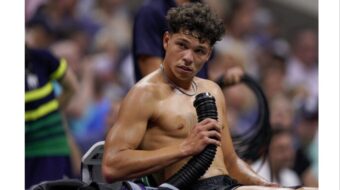
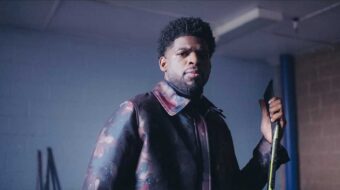
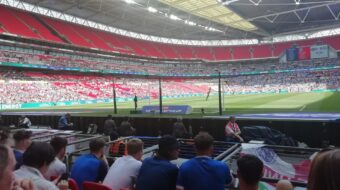






Comments